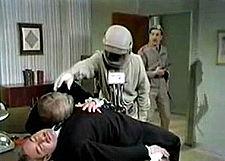Written by David Whitaker, Trevor Ray, and Malcolm Hulke
Directed by Michael Ferguson
Technically speaking, this serial isn’t easily available. I wound up watching most of it via You Tube videos with mismatched audio tracks, shifting between B&W and color without warning. Yet it was still possible to follow the story, so I suppose it’s worth some commentary. (And actually, seeing it in 10-minute chunks wasn’t so bad.)

“Spearhead From Space” was a great introduction for the Third Doctor, and while it was overlong, “The Silurians” had some great subtext and set up a solid character dynamic between the Doctor and the Brigadier. This story continues on a similar vein, though it’s not quite as strong as the two earlier works.
The story is familiar to modern sci-fi audiences: a mission to Mars encounters mysterious trouble, and what comes back is not human. Saturated with deadly radiation, necessary for their continued existence, the aliens present a quandary: is this the advent of yet another alien invasion, or a misunderstanding?
Well, just posing the question more or less answers it. Here we have a reflection of “The Silurians”, where the Doctor is working desperately to decode the intentions of the aliens and show that the seemingly hostile actions are more about self-preservation than anything else. It’s really a commentary on the mysteriously vague “other” and our tendency to assume the worst of what we don’t fully understand.
There’s some wonderful iconic imagery here, particularly the spacesuits, obscuring the faces beneath, walking slowly but surely in their deadly pace. It’s a discomforting scene, to be sure, and it made watching this serial at this particular time absolutely perfect. (At time of writing, the sixth series of NuWho is set to premiere with an episode involving very similar imagery. All that is old is new again!)
In a relatively short time, Jon Pertwee has managed to make more of an impression on me as the Doctor than Patrick Troughton, which says a lot about how the reboot of the series at that time allowed for deeper characterization. (Also, the availability of the material is a huge boon.) This version of the Doctor has more of the self-centered arrogance behind his moral outrage, tempered by the occasional frivolousness. It’s what drives him to action, and because his idealism often clashes with the real world, it makes for great drama.
I do find the more grounded aspect of this period of the series a bit annoying, though, because the location shots feel completely out of place, especially the establishing shots. On the other hand, I know it’s a temporary conceit, and in the meantime, I have the sixth series of NuWho to satisfy my desire for stories on a wider canvas.
I’m also not warming up to Liz Shaw at all. The dynamic between the Doctor and the Brigadier works beautifully because both characters have a well-defined set of principals behind their actions and choices (and the writers haven’t gotten to the point where the Doctor is portrayed as absolutely right). But Liz has practically no character traits in comparison. She’s relegated to being the Doctor’s eye-candy companion, doing whatever the plot requires her to do. And for that matter, I just don’t think she’s particularly attractive, so that part of the equation doesn’t work for me.
The story is also a bit overlong and padded for the point it eventually makes. Ultimately, this is a counterpoint to “The Silurians”, with the Doctor’s moral point of view winning out over the military response this time. It keeps the scorecard neatly even going into “Inferno”.
Writing: 1/2
Acting: 2/2
Direction: 2/2
Style: 1/4
Final Rating: 6/10

